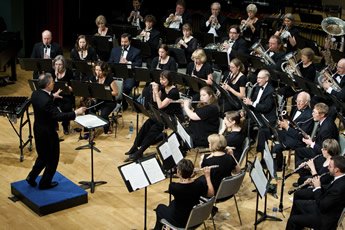The Winston-Salem Symphony, under the baton of Music Director Robert Moody, presented the dramatic opera Dialogues of the Carmelites by Francis Poulenc (1899-1963) as part of the conductor’s tenth anniversary in the city. The orchestra was upstage, and the action took place on the same stage, in front of the ensemble. The characters were in costume and minimal props and lighting helped give substance to the story. Slides were projected on the back wall to help set each scene. The production was sung in English, and thank goodness there were supertitles, because the orchestra too often overpowered the singers.
According to WSS publicity, “Poulenc’s landmark 1956 opera chronicles the struggle and martyrdom of the Carmel Order of Compiègne* during the French Revolution – a theatrical parable dealing with timeless issues of conscience and faith that transcends its story and time.” Indeed, Dialogues of the Carmelites is based on a true story: all of the Carmelite nuns were guillotined during the Reign of Terror in France in 1794. But the real story is about Blanche, a daughter of nobility who joins the order of the Carmelites to try to alleviate her fear of the mob violence.
Soprano Sarah Jane McMahon sang the role of Blanche; she sings in every scene of the 2 ½ hour show. She displayed amazing stamina, and her voice was clear and well suited to the role. Her acting seemed genuine and heart-felt. Catherine Zachary sang the role of her companion, Sister Constance. Her lovely high soprano voice helped depict her cheerful, optimistic viewpoint, a foil to the darker disposition of the rest of the opera.
The opera opens with Blanche telling her father, the Marquis de la Force (sung by baritone Troy Cook), that she wants to become a nun. Cook was appropriately fatherly in a teasing yet consoling fashion – his singing seemed a bit gruff for the role, though. Daniel Stein sang the role of his son, the Chevalier. His voice was solid and clear throughout the opera.
Mezzo-soprano Mary Gayle Greene sang the role of the old Prioress. This character is dying, and in her delirium she thinks that perhaps God has forsaken her. Her rich voice was one of the highlights of the evening – the audience could almost always hear her, and her passionate pleading smoothly employed the full range of her voice from top to bottom.
Jill Gardner sang the role of the new Prioress. Hers is a big voice that also expressed great passion, although to this listener her chest voice sometimes seemed a bit too raw. Diana Yodzis sang the role of Mother Maria, the assistant Prioress. This is a lovely voice that added depth and profundity to the action.
The convent priest, a man one step ahead of the mob, was effectively sung by James Allbritten. Simon Petersson sang the role of the 1st Commissioner and his cohort Chris Gilliam was the Second Commissioner.
The Winston-Salem Symphony Chorale sang as the French mob backstage and appeared in the final scene, encircling the audience. Carole Ott prepared the ensemble.
Carey Kugler was stage director and the minimal acting and stage props were sufficient to get a sense of what was happening. The orchestra sounded really good and powerful under Moody’s dramatic direction. Musical entrances were not always in synch, but the overall effect was appropriately chilling.
The opera will be presented again on Nov. 18. For details, see the sidebar.
*Residents of Raleigh will recognize Compiègne as one of the capital’s sister cities.











